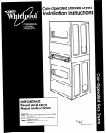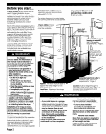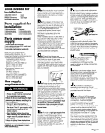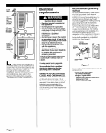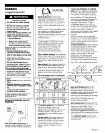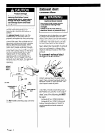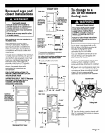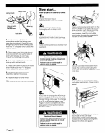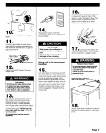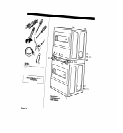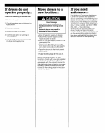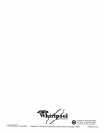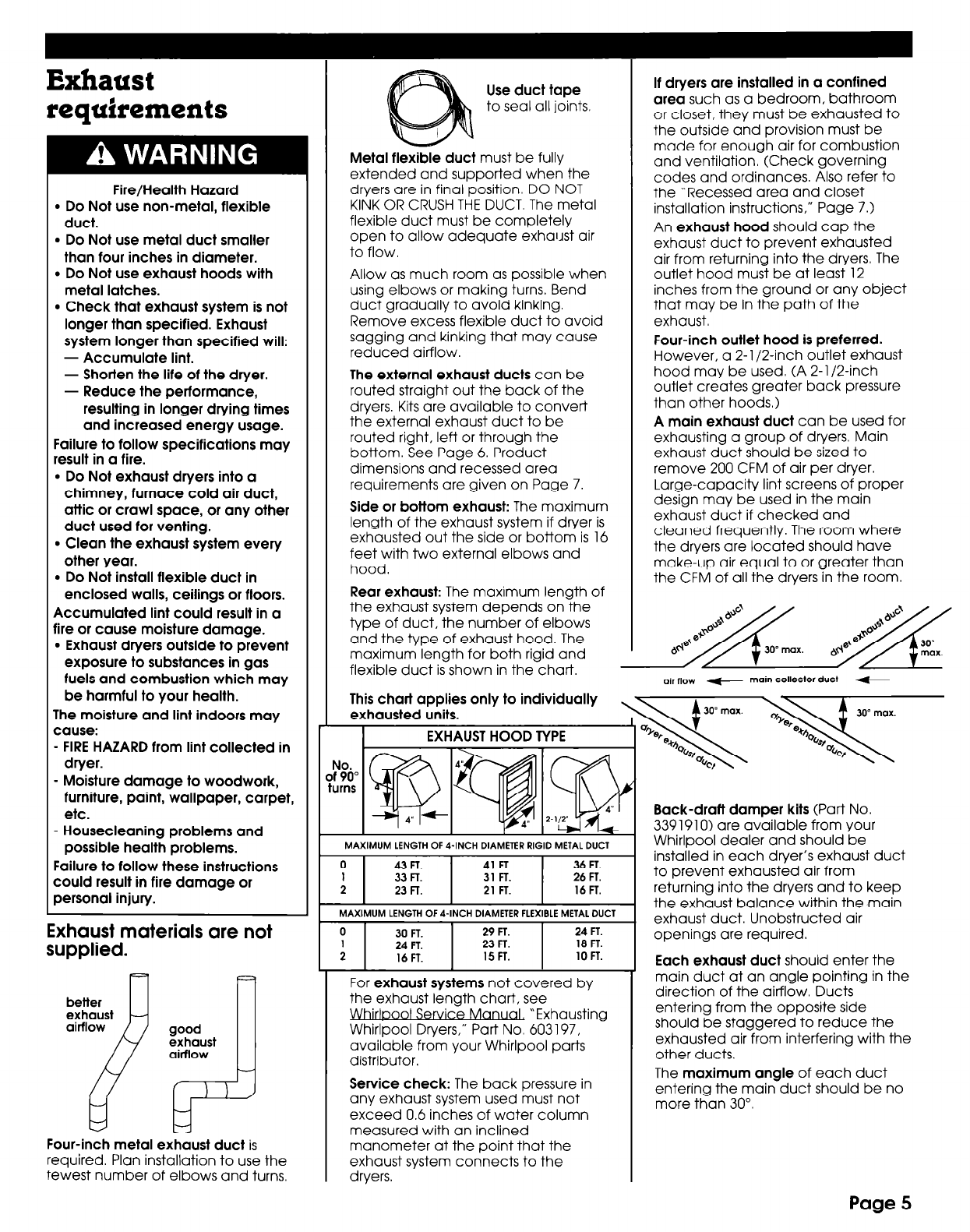
Exhaust
requirements
Fire/Health Hazard
l
Do Not use non-metal, flexible
duct.
l
Do Not use metal duct smaller
than four inches in diameter.
l
Do Not use exhaust hoods with
metal latches.
l
Check that exhaust system is not
longer than specified. Exhaust
system longer than specified will:
- Accumulate lint.
- Shorten the life of the dryer.
- Reduce the performance,
resulting in longer drying times
and increased energy usage.
Failure to follow specifications may
result in a fire.
l
Do Not exhaust dryers into a
chimney, furnace cold air duct,
attic or crawl space, or any other
duct used for venting.
9 Clean the exhaust system every
other year.
l
Do Not install flexible duct in
enclosed walls, ceilings or floors.
Accumulated lint could result in a
fire or cause moisture damage.
. Exhaust dryers outside to prevent
exposure to substances in gas
fuels and combustion which may
be harmful to your health.
The moisture and lint indoors may
cause:
- FIRE HAZARD from lint collected in
dryer.
- Moisture damage to woodwork,
furniture, paint, wallpaper, carpet,
etc.
- Housecleaning problems and
possible health problems.
Failure to follow these instructions
could result in fire damage or
personal injury.
Exhaust materials are not
supplied.
Four-inch metal exhaust duct is
required. Plan installation to use the
fewest number of elbows and turns.
Use duct tape
to seal all joints.
Metal flexible duct must be fully
extended and supported when the
dryers are in final position. DO NOT
KINK OR CRUSH THE DUCT. The metal
flexible duct must be completely
open to allow adequate exhaust air
to flow.
Allow as much room as possible when
using elbows or making turns. Bend
duct gradually to avoid kinking.
Remove excess flexible duct to avoid
sagging and kinking that may cause
reduced airflow.
The external exhaust ducts can be
routed straight out the back of the
dryers. Kits are available to convert
the external exhaust duct to be
routed right, left or through the
bottom. See Page 6. Product
dimensions and recessed area
requirements are given on Page 7.
Side or bottom exhaust: The maximum
length of the exhaust system if dryer is
exhausted out the side or bottom is 16
feet with two external elbows and
hood.
flexible duct is shown in the chart.
Rear exhaust: The maximum length of
the exhaust system depends on the
type of duct, the number of elbows
and the type of exhaust hood. The
maximum length for both rigid and
This chart applies only to individually
,
exhausted units.
I
EXHAUST HOOD TYPE
MAXIMUM LENGTH OF 4-INCH DIAMETER RIGID METAL DUCT
0
43 FT. 41 FT.
36 FT.
1
33 FT. 31 FT.
26 FT.
2
23 FI. 21 FT.
16 FT.
MAXIMUM LENGTH OF I-INCH DIAMETER FLEXIBLE METAL DUCT
0
30 FT.
29 FT.
24 FT.
1
24 FT. 23 FT.
18 FT.
2
16 FT. 15 FT.
10 FT.
For exhaust systems not covered by
the exhaust length chart, see
WhirlDool Service Manual, “Exhausting
Whirlpool Dryers,” Part No. 603197,
available from your Whirlpool parts
distributor.
Service check: The back pressure in
any exhaust system used must not
exceed 0.6 inches of water column
measured with an inclined
manometer at the point that the
exhaust system connects to the
dryers.
If dryers are installed in a confined
area such as a bedroom, bathroom
or closet, they must be exhausted to
the outside and provision must be
made for enough air for combustion
and ventilation. (Check governing
codes and ordinances. Also refer to
the “Recessed area and closet
installation instructions,” Page 7.)
An exhaust hood should cap the
exhaust duct to prevent exhausted
air from returning into the dryers. The
outlet hood must be at least 12
inches from the ground or any object
that may be in the path of the
exhaust.
Four-inch outlet hood is preferred.
However, a 2- l/2-inch outlet exhaust
hood may be used. (A 2-l/2-inch
outlet creates greater back pressure
than other hoods.)
A main exhaust duct can be used for
exhausting a group of dryers. Main
exhaust duct should be sized to
remove 200 CFM of air per dryer.
Large-capacity lint screens of proper
design may be used in the main
exhaust duct if checked and
cleaned frequently. The room where
the dryers are located should have
make-up air equal to or greater than
the CFM of all the dryers in the room.
Back-draft damper kits (Part No.
3391910) are available from your
Whirlpool dealer and should be
installed in each dryer’s exhaust duct
to prevent exhausted air from
returning into the dryers and to keep
the exhaust balance within the main
exhaust duct. Unobstructed air
openings are required.
Each exhaust duct should enter the
main duct at an angle pointing in the
direction of the airflow. Ducts
entering from the opposite side
should be staggered to reduce the
exhausted air from interfering with the
other ducts.
The maximum angle of each duct
entering the main duct should be no
more than 30”.
Page 5



